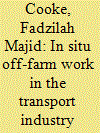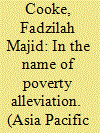|
|
|
Sort Order |
|
|
|
Items / Page
|
|
|
|
|
|
|
| Srl | Item |
| 1 |
ID:
088011


|
|
|
|
|
| Publication |
2009.
|
| Summary/Abstract |
Lerner's description contextualises our interest
in borders. The papers in this special section of
Asia Pacific Viewpoint have been inspired by
recent work that examine borders not as
forever peripheral to core interests of the state,
but as sites of opportunity for state actors and
institutions, personal discovery of freed spaces
for identity formation and alternative gender
roles (Schendel and Abraham, 2005; Tagliacozzo,
2005; Horstman and Wadley, 2006).
They deal with both metaphoric and national/
jurisdictional boundaries by privileging narratives
of those who are actually involved in
negotiating one or both (Kyle and Siracusa,
2005). The papers further address the hierarchies
of
|
|
|
|
|
|
|
|
|
|
|
|
|
|
|
|
| 2 |
ID:
088013


|
|
|
|
|
| Publication |
2009.
|
| Summary/Abstract |
This paper examines the informal transport sector within the smallholder oil palm economies of Kinabatangan and Lahad Datu areas of eastern Sabah by looking at the metaphoric border that is constructed between licit and illegal activities that take place on roads. It describes the work of two groups of drivers, namely, those who are themselves smallholders who provide a crucial service to the community in getting their fresh fruit bunches to mills on time; and the piret (pirate) taxis who transport passengers including foreign nationals, some of whom are illegal workers. Many have been driving for some time, thereby challenging the notion about off-farm work as providing a temporary safety net to smallholders. Drivers whose permits may be current may have used illegal means (such as meminggir - logging without licence), to accumulate the initial funds for acquiring their vehicles and necessary permits. Moreover, their clients are unconcerned about their 'illegal' status. Consequently, this paper maintains that there is no agreed-upon norms about legality/illegality, and law enforcement being uneven, the zone in which drivers operate is a fluid one.
|
|
|
|
|
|
|
|
|
|
|
|
|
|
|
|
| 3 |
ID:
117138


|
|
|
|
|
| Publication |
2012.
|
| Summary/Abstract |
Oil palm in Sabah is grown in large plantations or smallholdings, the latter mostly managed by indigenous peoples on untitled customary land. Government development agencies have long focussed on improving the productivity of smallholders for poverty alleviation. For most smallholders, the main issue is tenure insecurity: as long as lands remain untitled they are subject to changes in land allocation and land use at the discretion of the State Government. Indigenous claimants seek recognition of the right to use and occupy ancestral lands via individual Native Titles (NT), as provided for in the Sabah Land Ordinance (SLO). Recent official push for converting such 'idle' customary lands by promoting large scale joint ventures between customary landowners and oil palm companies is creating anxiety among many indigenous groups. The joint-venture approach has been enabled through a crucial amendment to the SLO that promotes the granting of communal titles (CT) with conditions attached. This tenure instrument empowers state-appointed trustees to make key decisions concerning land use where commercial crops (especially oil palm) are favoured and on the eligibility of descendants (pewaris) to participate in the joint venture or not. The complexity of local concerns and official responses is captured via a case study at Lalampas in the Tongod District of Sabah.
|
|
|
|
|
|
|
|
|
|
|
|
|
|
|
|
| 4 |
ID:
165110


|
|
|
|
|
| Summary/Abstract |
This article, which looks at Indigenous communities in the multiethnic, multicultural region of Sabah, East Malaysia, on the island of Borneo, argues that indigeneity is not primordial, but exists in relation to dominant identities as well as other non-dominant, Indigenous groups. Moreover, Indigenous Peoples are not passive recipients of colonial or even postcolonial Othering: their identity is contextualised and contested within majority–minority relations. The article begins with a brief history of the dominant Kadazandusun nationalism in Sabah, in the context of the overarching Bumiputra policy of Malaysia, which privileges constructed Malayness, as background to the discourses and practices of smaller groups of land-based Murut and the sea-oriented ‘Bajau’, where identity switching is taking place in tandem with environmental justice claims. The land-based communities (Murut) have found leverage in making identity and livelihood claims attached to place (here, state-declared forest reserves that seek to exclude them) in line with the recent global environmental justice focus on participatory conservation rather than the older ‘fortress conservation’ model still dominant in state conservation thinking. However, the sea-oriented peoples (Bajau) require other social symbols than land for making their identity claims, in this instance, via claims to ‘modern’ livelihoods and as managers of marine resources with reference to the newly established Tun Mustapha Park. In Sabah, participatory conservation is being reappropriated by Indigenous Peoples to assert claims about place and /or livelihoods; if bureaucratised, however, this form of conservation might turn out to be less than participatory.
|
|
|
|
|
|
|
|
|
|
|
|
|
|
|
|
|
|
|
|
|